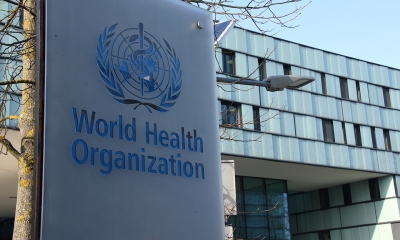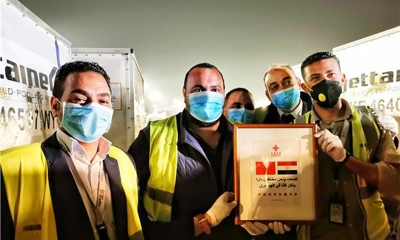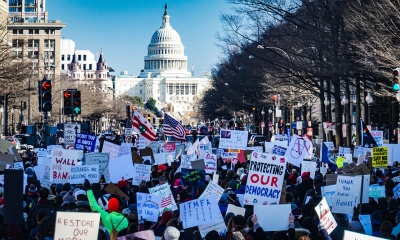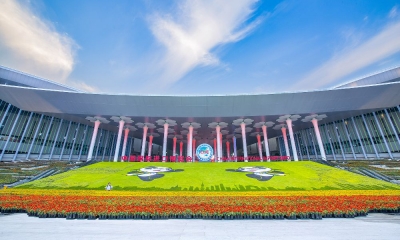Africa Is China’s Strategic Depth

On September 3, President Xi Jinping will deliver a keynote speech at the opening ceremony of the Forum on China-Africa Cooperation (FOCAC) 2018 Beijing Summit.
On September 3, President Xi Jinping will deliver a keynote speech at the opening ceremony of the Forum on China-Africa Cooperation (FOCAC) 2018 Beijing Summit with the theme of Win-Win Cooperation and Joining Hands to Build a Closer Community with a Shared Future for China and Africa.
Since its establishment in 2000, the FOCAC mechanism has been a successful key platform for the collective dialogue and cooperation between China and African countries.
In the past 18 years, many ccooperation plans have been rolled one by one between China and the African continent. Relations have been rapidly boosted to the strategic stage including in trade, economy, sustainable development, education, health and climate change.
When China put forward the slogan of sharing the future, it meant what it said. China knows very well that its long-term future is linked to the African continent’s future.
Δ President Xi Jinping delivers a speech at the opening ceremony of the 6th Forum on China Africa Cooperation, Johannesburg, in December 2015. It was South African President Jacob Zuma greeting Xi. (Photo / Xinhua)
Why China Pursues a Strategic Partnership with Africa
First, the Chinese economy has slowed down. China’s 14.2 growth rate in 2007 was hit by the global financial crisis and slowing growth in Europe. It continued its average growth rate of 6.9 in 2017, but many existing projects were threatened and pressured because of high costs and declining earnings.
Second, the United States is threatening China. The United States has realized China’s capacity and that in the near future China may overtake it in terms of high-tech products. This is what the United States dreads, thus it has already begun to take a series of offensive measures on imports from China by imposing tariffs on Chinese products. That put more pressure on the Chinese economy and the growth rate which will affect the unemployment rate. Thus, there must be alternative markets that can absorb the surplus products stocked due to the trade war with the United States.
Third, China has a huge foreign exchange reserve of $3.12 trillion. It has the largest foreign exchange reserves and needs to invest it. The U.S. trend is to curb Chinese investment within the United States; therefore, China needs other countries in which to invest this money. Africa is the best place since it is in dire need of investment.
Fourth, the Chinese economy is changing to modern industries and trade in services. China’s economic policy has tended to be more conducive to new technological industries and to the transformation of the economy into trade in services rather than relying on traditional industries. At the same time, China cannot give up its legacy of traditional industries.
Hence, the African continent is the appropriate place to transfer these industries and the work tied to them to build a successful complementary partnership for all parties. On the one hand, the African continent has the capacity to manufacture, produce and achieve unprecedented income. On the other hand, China guarantees the availability of these products, which are indispensable to its economy.
Δ Stewardesses of Addis Ababa-Djibouti Railway pose for pictures after the arrival of the first commercial train from Addis Ababa at a platform at Nagad railway station in Djibouti on January 3, 2018.
China Already Started its Strategic Relations with Africa for Win-Win Cooperation
The first thing China established was economic cooperation. In June 2017, global consulting firm McKinsey & Co. released a report estimating that there are more than 10,000 Chinese-owned firms operating in Africa.
China established many successful economic zones in such African countries as Zambia, Mauritius, Ethiopia, Nigeria and Egypt.
These zones allowed Africa to increase its production and exports, improve the quality of life and increase the condition of millions of Africans.
The second thing China has proposed is the Belt and Road Initiative. One of the strategic roles of the initiative is to link China with its strategic partner Africa through mega infrastructure projects including ports, airports, railways and roads to pave the way for an African industrial boom.
The third incentive is Chinese Foreign Direct Investment. At the last FOCAC summit in 2015, Xi announced $60 billion of soft funds for 10 major China-Africa cooperation plans covering the areas of industrialization, agricultural modernization, infrastructure, financial services, green development, trade and investment facilitation, poverty reduction and public welfare, public health, people-to-people exchanges, and peace and security.
Lastly, China opened its market to African products. China’s imports from Africa grew rapidly to a value of $75.3 billion in 2017, up 33 percent year on year. Furthermore, it is expected to continue to grow as Xi vowed to open China’s market even more.
Δ Ethiopian workers and Chinese management in the Huajian shoe factory in the Eastern Industry Zone near Addis Ababa, a Special Economic Zone modelled after China’s southern city of Shenzhen. (Photo / Michiel Hulshof & Daan Roggeveen)
Africa Seeks Economic Reforms at a Rapid Pace
African countries are well aware that reforms have to be made for investments to come. Many African countries have already begun to make several changes to their investment legislation and are adding new incentives to attract more foreign investment.
According to a 2018 World Bank report on Sub-Saharan Africa, it is the region with the highest number of reforms for the second consecutive year. These countries passed 83 new business regulations in 2017, showing their real determination to reform and provide an appropriate environment for attracting investment.
Progress was also made in terms of the overall measure of the ease of doing business on the continent. This also includes making it easier for small and medium size domestic firms to do business.
Another progress also was made in terms of the overall measure of the ease of doing business. According to World Bank Doing Business 2018 report, some African countries already have a better ranking than China which comes in at 78. Mauritius ranked 25, Rwanda 41 and Morocco 69. Other African countries are very close to China’s ranking like Kenya at 80, Botswana at 81 and South Africa at 82. That means reforms in Africa have already begun and will continue.
Finally, we can see that all parties are working firmly to build a new model for a Sino-Africa strategic partnership. No doubt that the 2018 Beijing FOCAC summit will produce a giant leap in China-Africa relations in all fields.
The author is the First Economist Researcher at the Central Department for Export and Import Policy of the Egyptian Ministry of Foreign Trade and Industry
Editors: Yuan Yanan, Cai Hairuo
Intern Editor: Yang Ruoxi
Opinion articles reflect the views of their authors, not necessarily those of China Focus
 Facebook
Facebook
 Twitter
Twitter
 Linkedin
Linkedin
 Google +
Google +










